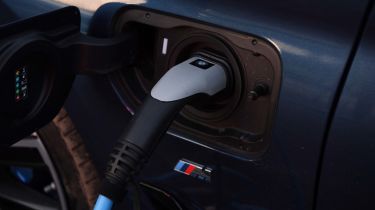BMW 530e hybrid range, MPG, CO2 & charging
With a pure-electric range of less than 40 miles, the outgoing 530e isn’t as competitive as it one was. But it can still be cheap to run
| Model | Electric range | Fuel economy | CO2 emissions | Charge time |
|---|---|---|---|---|
| 530e | 36-37 miles | 188-202mpg | 31-34g/km | 3hrs 36mins (0-100%, 3.7kW) |
| 530e xDrive | 32-34 miles | 157-177mpg | 37-40g/km | 3hrs 36mins (0-100%, 3.7kW) |
The BMW 530e – and its more powerful 545e sibling – will go far enough on electric power to satisfy the average commuter, while its CO2 emissions make for very low company-car tax. The 2.0-litre turbocharged petrol engine should also deliver reasonable economy of somewhere near 40mpg once the battery has been depleted.
BMW 530e hybrid range, MPG & CO2 emissions
The BMW 530e’s official pure-electric range of between 32 and 37 miles (depending on exact specification) used to be competitive, but updated rivals like the Volvo S90 now have much bigger batteries for greater electric range. As with most plug-in hybrids, the BMW will rarely match that claimed figure, either – we saw about 25 miles in colder weather, and you can expect even less if you venture onto the motorway.
As with most hybrids, the BMW can hold the battery's charge until you want to use it. It also has a clever feature that allows you to hold a specific percentage of charge. It’s a good idea to do this on faster roads, when the petrol engine will return its best economy. You can then fall back on the pure-electric ‘Max eDrive’ mode for city driving, where electric motors are most efficient.
Charge time
It's easy to charge the 530e, though some PHEVs can top up quicker. The BMW uses a standard Type 2 connector, which works with the vast majority of public, home and workplace charging points and will fill your battery in around three-and-a-half hours. This is due to the relatively slow 3.7kW on-board charger; newer rivals get 7.4kW tech, while EVs feature CCS rapid charging.
But even if all you have is a standard external three-pin socket (max 2.3kW) at home, that's fine; there's a cable for that too, and it'll still top out the battery in less than six hours, so overnight charging is entirely feasible.

